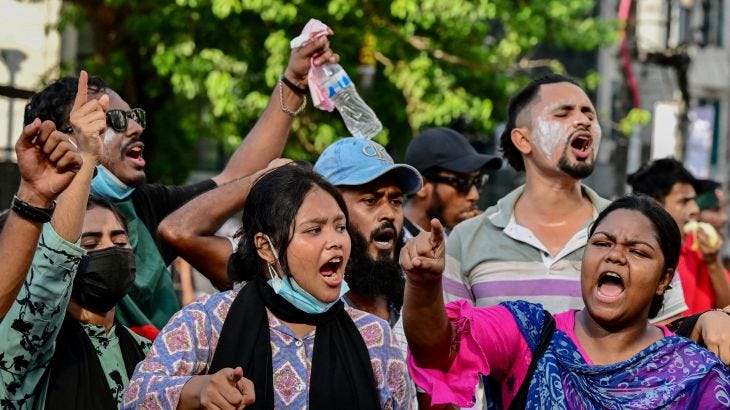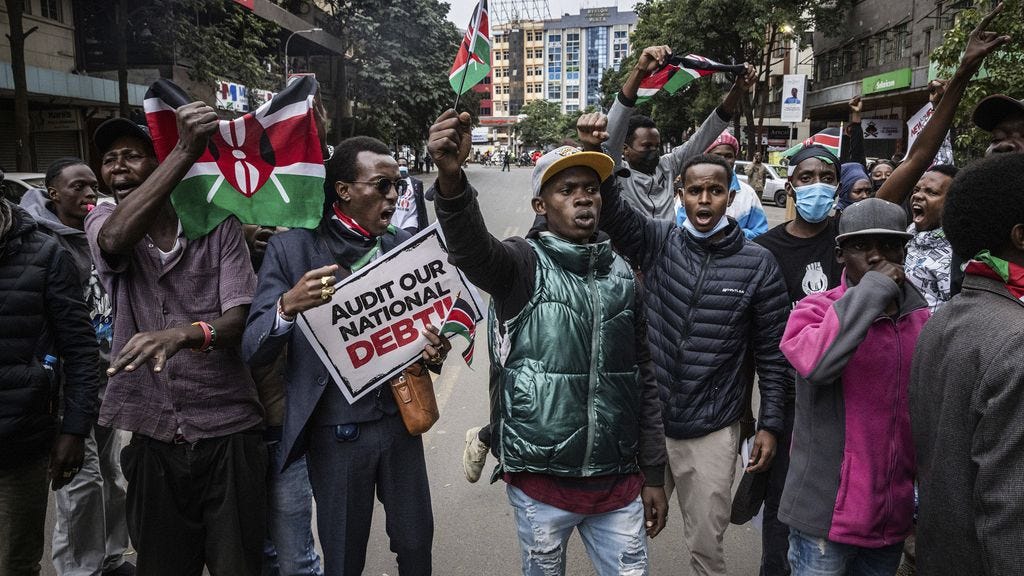What can America learn from global protests?
In countries around the world, people are raising their voices and expressing their demands and discontent in the streets. How long before chaos comes to America?
Over the past few weeks, while most Americans have been laser focused on the movie-like drama around who’s running for President, who’s actually running the country, and (of course) the attempted assassination, a vast majority have missed hearing about significant protests happening all around the world.
The unrest reflects broader global trends of public dissent fueled by corruption, financial hardship, political grievances, and social inequalities. Many of the protest movements are calling for massive reforms and political upheaval to address underlying social, political, and economic issues.
Is there a lesson for America in all this?

Bangladesh: At least 174 people are dead and thousands are behind bars following student-led protests that began two weeks ago in one of the world’s poorest and most populous countries. Protestors have called for an end to a contentious job quota system that has, for the past 50 years, set aside one third of government roles for the descendants of individuals who participated in the country's liberation war. Another quarter of government positions have further been reserved for members of various minority groups, including ethnic communities, women, individuals with disabilities, and people from underrepresented districts. This leaves hundreds of thousands of qualified university graduates competing for just 3,000 coveted government jobs each year, which pay well and are considered stable employment.
The demonstrators forced the Supreme Court to scale back the quota system on Sunday, which had been temporarily lifted in 2018 but was reinstated recently. Students are now demanding the government release protest leaders, lift a military curfew, and reopen universities. Industry leaders are also appealing to the government to withdraw the curfew and restore internet service, as the measures to quell the protests have battered the economy, leading to estimated losses of more than $1.2 billion, according to the country’s business community.
(READ MORE: AlJazeera | Foreign Policy | CBS News)

Uganda: Inspired by youth-led protests in neighboring Kenya, organizers of an anti-corruption march followed through on their plans Tuesday, despite being warned by President Yoweri Museveni that they were “playing with fire.” Protestors want to root out corruption in the east African nation, which has been autocratically ruled by the 79-year-old Museveni for nearly 40 years. “What right… do you have to seek to generate chaotic behavior,” Museveni asked in a televised address on Saturday. “We are busy producing … cheap food, other people in other parts of the world are starving.”
News reports indicate the capital, Kampala, has been placed in lockdown on Tuesday and several demonstrators have already been arrested. One demand from the protestors is the resignation of Parliament Speaker Anita Among, who was recently sanctioned by the United States, along with her husband and several other officials, over alleged corruption and serious human rights abuses. An influential member of the ruling party, Among represents the rampant abuse of power that young Ugandans vehemently oppose. She allegedly collected huge sums of money — nearly $900,000 USD over six months — in allowances for foreign travel, including for trips that never happened.
(READ MORE: DW | Daily Monitor | AP)

Kenya: Widespread anti-government protests have now entered their sixth week, sparked initially by opposition to proposed tax hikes in a controversial finance bill. These primarily youth-led protests have evolved into broader demonstrations against government corruption, economic mismanagement, and the high cost of living. The situation is marked by clashes with police, leading to arrests, fatalities, and injuries.
President William Ruto declined to sign the controversial finance bill that sparked the protests and has dismissed almost all of his Cabinet ministers, but protesters have continued to call for his resignation. On Tuesday there were calls for “a total shutdown” as protestors seized control of Nairobi’s main international airport.
(READ MORE: AfricaNews | CNN | Reuters)

Venezuela: A country grappling with severe economic collapse, political repression, and a humanitarian crisis will go to the polls on July 28, and voters are likely to express their deep-seated frustrations with the regime of President Nicolás Maduro. Protests have intensified ahead of the vote, driven by a mix of political, economic, and social grievances.
Highly popular opposition leader Maria Corina Machado was banned from holding office in 2023, but she has been traversing the country in support of 74-year-old Edmundo Gonzalez Urrutia, a little-known former diplomat who was chosen as his party’s last-minute figurehead.
The opposition party is currently polling way ahead of Maduro, who rose to power after the death of Hugo Chavez death in 2013. Maduro’s attempts to address an economic crisis created by Chavez’s economic mismanagement and corruption include a money-printing policy that has pushed the country into years-long hyperinflation — causing widespread poverty, shortages of basic necessities, and a massive exodus of millions fleeing the country. Still, Maduro vows he will not cede power and warned recently that Venezuela risks a "bloodbath" if he loses.
(READ MORE: AP | Council on Foreign Relations | Voice of America).
Important Lessons for America
The situation in Bangladesh highlights how seemingly well-intentioned policies aimed at rectifying historical injustices create new and unexpected forms of exclusion and inequality. America needs to return to what it does best: reward those who have skills, competence, and work ethic rather than embrace a woke, radical agenda where allowances and advantages are given out as lagniappes.1 As it stands, the system in America has been gamed with fake accounting for historic injustices, synthetic integration of diversity and gender, and even, to some extent, policies that encourage reverse racism. Time to right the ship by rewarding the best and brightest and work to avoid unintended negative consequences.
Uganda's struggle with corruption and misuse of public funds serves as a stark reminder that transparency and accountability are crucial in governance and that government patronage and nepotism can shatter public trust. Public officials must be held to the highest ethical standards. Corruption is a cancer on this Republic and runs contrary to the entire struggle by our founding fathers to free themselves of the monarchy and its perversions. Every citizen needs to know that this cancer is incurable and ends in paying the ultimate price: death.
The protests in Kenya demonstrate how economic policies that disproportionately burden the populace can lead to significant unrest. Economic mismanagement and the high cost of living fuel widespread discontent. In fact, this nation is yoked by policies made by an Ivory Tower ‘expert’ class that is wholly unfamiliar with the everyday struggles of Americans. If this is allowed to continue, the discontent will undoubtedly bubble over into the streets of the US, as well.
Venezuela's dire situation underscores the dangers of excessive money printing and poor economic management. The United States seems to be on a similar path to hyperinflation that may well be unavoidable, in spite of all the warning signs and cautionary tales. Worse, many say taxation is akin to theft; those in power also know that overtaxation breeds discontent. Thus, money printing is a far stealthier way to transfer wealth away from the vast majority of unsuspecting Americans and into the pockets of oligarchs and big banks.


Hopefully we will open our eyes. But when the narrative is set by the MSM who doesn’t really care about the average person, we can not expect to ever hear about these stories.
Not a word about the devastating effects of U.S. sanctions policies on the Venezuelan economy?
No mention of the success Maduro has had in housing the homeless? No wonder, when your information sources include the C.F.R. and Voice of America.